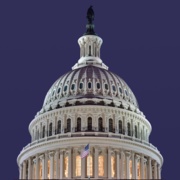Dear Representative,
As the House of Representatives considers the Inflation Reduction Act of 2022, we hope that conclusions based on scientific evidence will inform deliberations on climate change.
People are changing climate and it poses serious risks to humanity and nature in the United States and throughout the world. We know this from decades of intensive scientific research. Here are the scientific conclusions about climate change that all members of Congress should keep in mind.
Climate change is dangerous to humanity and all life
- Climate is a basic life-support system for people and all life.
- Global climate changes occurring now are larger and faster than any humanity is known to have endured since our societal transition to agriculture.
- The physical characteristics of the planet, biological systems and the resources they provide, and our societal creations (our infrastructure, institutions, and ways of living) are all adapted to climate, sensitive to climate change, and central to human well-being.
- Extreme weather events are already made worse by climate change as predicted by climate scientists.
People are changing climate
- Multiple independent lines of scientific evidence confirm that people bear responsibility for climate change.
- The patterns of climate change occurring now can be explained only by including human-induced greenhouse gas emissions, and not solely with any combination of natural drivers (e.g., sun, volcanoes, changes in land use, or variability).
These scientific conclusions result from decades of intensive research and examination
- The warming effect of our greenhouse gas emissions has been demonstrated through laboratory experiments, evidence from past changes in climate on Earth, numerical models of the climate system, and the consequence of greenhouse gases on other planets.
- The scientific evidence has been assessed comprehensively by independent scientists and scientific organizations based on multiple independent sources.
- No broadly contradictory assessments from credible scientific organizations exist.
- Validity is central to credibility of scientific institutions such as the U.S. National Academy of Sciences, American Meteorological Society, and American Association for the Advancement of Science, all of which have assessed climate science.
Solutions are available and highly promising–a serious reason for optimism.
- Industrial greenhouse gas emissions are an economically harmful market failure. Those who emit pollution to the atmosphere shift the costs of climate damage onto everyone, including future generations. Making emitters pay for all the costs of their use of our atmosphere would help correct this failure and thereby improve economic well-being.
- Federal investments and regulatory approaches can incentivize private investment and innovation, speed the adoption of best practices, lower economic barriers, promote broadly beneficial technologies, enhance public interest, and improve equity and fairness.
- As a result, reducing greenhouse gas emissions can increase climate security, national security, the well-being of biological systems, and economic vitality.
- Existing and emerging technologies such as roof-top solar, electric vehicles, and electric heat pumps can reduce greenhouse gas emissions, improve air quality in our homes and cities, and often provide superior products or services.
- Building our resilience to climate impacts (adaptation) makes communities stronger and better able to deal with both existing vulnerabilities and emerging threats.
Comprehensively addressing the dangers of climate change will require reducing, and ultimately eliminating, our climate pollution as soon as possible along with additional efforts to overcome the unavoidable consequences of our past emissions.
But climate change is a solvable challenge. We will need to work together. We will need to harness human ingenuity. Many of the solutions are well understood and provide an enormous economic opportunity for the country.
If you have any questions about the science of climate change, or if we can help in any other way, please reach out.
Sincerely,
Paul Higgins, Associate Executive Director, American Meteorological Society
Stella Kafka, Executive Director, American Meteorological Society
Richard Clark, President, American Meteorological Society
